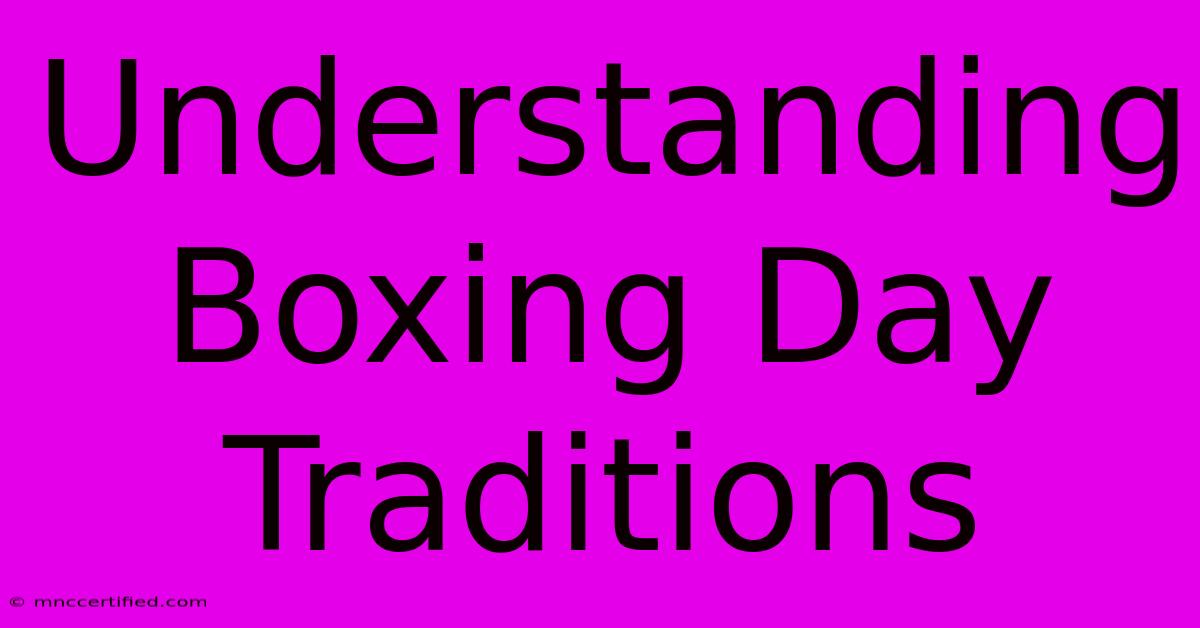Understanding Boxing Day Traditions

Table of Contents
Understanding Boxing Day Traditions: A Festive History and Modern Celebrations
Boxing Day, a holiday celebrated annually on December 26th in many Commonwealth countries, holds a rich and fascinating history. While often associated with post-Christmas sales and festive gatherings, its origins are far more nuanced than simply discounted shopping. Understanding its traditions requires a delve into its historical roots and a look at how those traditions have evolved over time. This article will explore the multifaceted nature of Boxing Day, providing a comprehensive overview for both seasoned celebrants and curious newcomers.
The Historical Roots of Boxing Day: More Than Just a Day Off
The exact origins of Boxing Day remain debated, with several competing theories vying for prominence. One popular theory links the holiday to the medieval practice of giving "Christmas boxes"—gifts of money or goods—to servants and tradespeople. These boxes, often filled with leftover Christmas treats and small gifts, represented a gesture of gratitude for their service throughout the year. This act of generosity wasn't limited to the wealthy; it was a common practice across different social strata.
Another theory suggests that Boxing Day’s roots lie in the practice of collecting alms for the poor on the day after Christmas. Churches and charitable organizations would solicit donations, adding another layer of social significance to the day.
Regardless of its precise origin, the act of "boxing"—whether it involved gifting boxes to servants or collecting donations for the less fortunate—formed the foundation of Boxing Day's early traditions. These acts reflected a blend of social obligation, charitable giving, and the sharing of seasonal bounty.
The Evolution of Boxing Day Traditions: From Alms to Sales
Over time, Boxing Day's traditions have evolved considerably. While the spirit of generosity persists, the modern celebrations are markedly different from those of centuries past. The post-Christmas sales, a significant aspect of Boxing Day in many countries, are a relatively recent phenomenon, primarily driven by the rise of consumerism and retail commerce. The day has become a prime opportunity for shoppers to snag bargains and retailers to clear out excess stock.
However, many traditional practices remain. In some communities, charitable giving continues to be a central aspect of Boxing Day. Others maintain the tradition of family gatherings, often involving festive meals and games, solidifying its role as a continuation of the Christmas celebrations. Sporting events, particularly football (soccer) matches, are also a key feature of Boxing Day in many countries, adding to its festive atmosphere.
Regional Variations in Boxing Day Celebrations: A Global Perspective
The way Boxing Day is celebrated varies significantly depending on geographical location and cultural context. While the holiday is observed across many Commonwealth countries, including the UK, Canada, Australia, and New Zealand, the specific customs and traditions may differ significantly.
-
United Kingdom: Boxing Day in the UK is often characterized by large family meals, sporting events, and the aforementioned post-Christmas sales. Fox hunting, though controversial, remains a tradition in certain regions.
-
Canada: Celebrations in Canada often involve similar family gatherings and sporting events. However, the emphasis on retail sales may be less pronounced than in the UK.
-
Australia: Boxing Day in Australia is notable for its association with the Melbourne Cup, a major horse racing event. It's a significant sporting and social occasion.
-
Other Countries: Many other countries with historical ties to the British Empire also observe Boxing Day, often adapting the traditions to their specific cultural contexts.
Modern Relevance and Future of Boxing Day Traditions
Boxing Day, despite its historical roots, remains a relevant holiday in the 21st century. Its capacity to blend traditional generosity with modern consumerism reflects the complex nature of society. However, a growing awareness of sustainability and ethical consumption is likely to influence future celebrations. We may see a renewed focus on charitable giving and community engagement, alongside a more conscious approach to the retail aspect of the day.
Key Takeaways:
- Boxing Day has deep historical roots, linked to both charitable giving and the rewarding of servants.
- Modern celebrations incorporate elements of tradition and consumerism.
- Regional variations in customs and traditions exist across different countries.
- The future of Boxing Day might see a shift towards greater emphasis on ethical and sustainable practices.
By understanding the historical context and regional variations of Boxing Day, we can better appreciate its enduring significance as a unique and multifaceted holiday, one that continues to evolve alongside the changing times.

Thank you for visiting our website wich cover about Understanding Boxing Day Traditions. We hope the information provided has been useful to you. Feel free to contact us if you have any questions or need further assistance. See you next time and dont miss to bookmark.
Featured Posts
-
Fulham Beats Chelsea Player Ratings
Dec 27, 2024
-
Ex Pm Manmohan Singh Dead At 92 India Remembers
Dec 27, 2024
-
Premier League Man City Draw With Everton
Dec 27, 2024
-
Premier League City Held To Draw
Dec 27, 2024
-
Condolences Former Indian Pm Passes
Dec 27, 2024